人教选修七Unit4Sharing教案
unit4《sharing》教案3(人教版选修7).doc
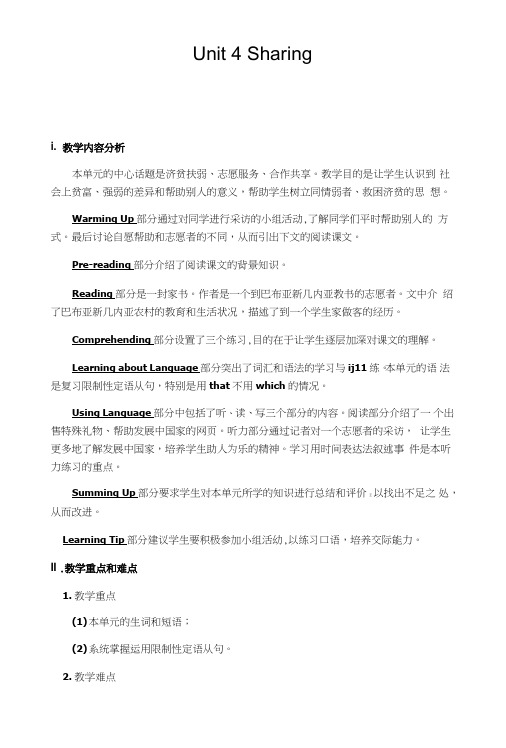
Unit 4 Sharingi. 教学内容分析本单元的中心话题是济贫扶弱、志愿服务、合作共享。
教学目的是让学生认识到社会上贫富、强弱的差异和帮助别人的意义,帮助学生树立同情弱者、救困济贫的思想。
Warminq Up部分通过对同学进行采访的小组活动,了解同学们平时帮助别人的方式。
最后讨论自愿帮助和志愿者的不同,从而引出下文的阅读课文。
Pre-readinq部分介绍了阅读课文的背景知识。
Reading部分是一封家书。
作者是一个到巴布亚新几内亚教书的志愿者。
文中介绍了巴布亚新几内亚农村的教育和生活状况,描述了到一个学生家做客的经历。
Comprehending部分设置了三个练习,目的在于让学生逐层加深对课文的理解。
Learning about Language部分突出了词汇和语法的学习与ij11练。
本单元的语法是复习限制性定语从句,特别是用that不用which的情况。
Using Language部分中包括了听、读、写三个部分的内容。
阅读部分介绍了一个出售特殊礼物、帮助发展中国家的网页。
听力部分通过记者对一个志愿者的采访,让学生更多地了解发展中国家,培养学生助人为乐的精神。
学习用时间表达法叙述事件是本听力练习的重点。
Summinq Up部分要求学生对本单元所学的知识进行总结和评价z以找出不足之处,从而改进。
Learninq Tip部分建议学生要积极参加小组活幼,以练习口语,培养交际能力。
II .教学重点和难点1.教学重点(1)本单元的生词和短语;(2)系统掌握运用限制性定语从句。
2.教学难点(1)认识帮助别人的重要性;(2)学会发表评论和表达自己的看法;(3)学会以时间为线索,叙述人物生平。
III .教学计划本单元建议分六课时:第一课时:Warming up, Pre-reading, Reading & Comprehending第二、三课时:Learning about Language第四课时:Reading and discussing ( Using Language )第五课时:Listening and speaking ( Using Language )第六课时:Reading task (Workbook), Speaking task (Workbook) & Writing task(Workbook)IV.教学步骤:Period 1 Warming up, Pre-reading, Reading & Comprehending Teaching Goals:1.To help Ss to learn the importance of helping others and the ways to help others.2.To help Ss to learn about the educational and living conditions of some developing countries and develop their awareness of helping those in need.3.To teach how to use the new words and phrases in the text.Teaching Procedures:Step 1. Leading-in1.Lead Ss to the content of this unit. Teacher may say, “We have all heard about Lei Feng, who was ready to help others and set us an example. We live our own lives. Everybody has his own work to do. Why must we help others?”2.Get some Ss to present their opinions on the question above before the class. Suggested Answer:Nobody can do everything alone, no matter how powerful he is. Nobody never meets with trouble, no matter how well he is going. So everybody needs others’ help. But we cannot always receive but never give. We must give in return for what we receive. We give help because we have been helped. Since we were born, we have received a lot from the society. So we should return it. We give help today, but we may need help tomorrow. Even if we may not see a person again, by helping him, we can let him know help is necessary and importantfor those who are in need. By helping each other, people can feel that life is full of warmth and friendliness and is worth living. In a word, to help others is to help oneself.Step 2. Warming Up1.Ask Ss to discuss the following question.In what ways do we help the people around?2.Ask Ss to work in groups of four and one of them to interview the other three. Tell him to ask the questions in Ex1 of Warming Up on P28. Then get one pair to act out their dialogues before the class.3.Divide Ss into four groups and ask them to discuss the following question.Can we call the person who helps others a “volunteer”?Suggested Answer:When one of your parents or friends needs help, you may not be asked to help but you volunteer to help, we don’t say you are a volunteer. A volunteer is a person who helps others in or outside his community or in a foreign country.Step 3. Pre-readingPurpose: To get Ss prepared for the reading text.1.Ask Ss to look at the pictures on P29 ~ P30 and guess what the passage talks about.2.Ask Ss to describe the students and their classrooms in the pictures. After that, let Ssimagine their living conditions.3.Lead Ss to the reading text. Teacher may say, “Today we are going to read a letter written by an Australian volunteer, Jo, who taught for two years in Papua New Guinea, a country to the sout h of Australia.”Step 4. SkimmingPurpose: To help Ss get the general idea of the letter.1.Ask Ss to listen to the tape and try to get the main idea of the text. Suggested Answer:In the letter, the writer wrote about the educational and living conditions in PNG and her experience of visiting a student’s village.2.Play the tape paragraph by paragraph and let Ss read after it. Then ask them to sumup the main idea of each paragraph with only one sentence.Suggested Answer:Para.2: The school is simply built an d far away from the students’ homes.Para.3: The educational conditions are very poor.Para.4: I visited a village of one of my student’ and received a warm welcome.Para.5: I stayed with the student’s family and their huts were poorly equipped.Para.6: I had a meal with the student’s family and they cooked in an unusual way.Para.7: I returned from the visit and felt greatly rewarded.Step 5. ScanningPurpose: To help Ss get a deeper understanding of the text..1.Ask Ss to find out the relationship of the people mentioned in the text. Teacher may say, “There are some persons mentioned in the text. Can you name them? Can you find out who they are?”Suggested Answers:Jo — the writer of the letter.Rosemary — the person who Jo is writing to.Tombe — one of the writer’s boy students, whose family Jo visited Jenny — thewriter’s fellow worker Kiak —Tombe’s mother Mukap —Tombe’s father2.Ask Ss to read the text carefully and ask them the following questions. It is better to read them out to Ss than to present them on the blackboard. Encourage Ss to keep the eyes away from the books when they answer the questions.(1)What is the school like?(2)Is the writer popular with her students? How do you know?(3)What is the writer’s difficulty in teaching?(4)Why did the students jump out of the windows?(5)Why does the writer wonder if she is making any difference to her students’ lives?(6)Was the writer warmly welcomed by the villagers? How do you know?(7)Do Mukap and Kiak usually sleep in the same house?(8)Where did the writer and Jenny sleep that night?(9)Why did Tombe throw away the tin can?Suggested Answers:(1)It is made of bamboo and the roofs are made of grass. It is from away from Ss’homes.(2)Yes. When she gets to school, the students all say hello to her.(3)There is no electricity or water and they have no textbooks. There is no teachingequipment.(4)Because they had never seen such an accident and were frightened.(5)Because most of her students will go back to their villages to work in the field andshe thought what they have learnt will be of no use.(6)Yes. Because Tmbe’s mother welcomed her by crying “ieee ieee” and the villager allshook hands with her warmly.(7)No. They sleep in their own huts.(8)They slept on a newly-made platform in Mukap’s hut.(9)Because they think throwing away the tin can is in fact throwing away evil spirits. Step 6. Language point1.Ask Ss to work in pairs and underline and translate the following phrases in the text.hear from, be dying to do sth., up to, adapt to, the other day, before I knew it, come across, make a difference to sb., get to know, shake hands with sb., stick out of, get through, a newly made platform, a couple of, build a fire, leave...to do sth., dry out, dry up, fall into bed2.Lead Ss to deal with some more language points.(1)be dying to do sth (line 2, paral): want very much to do sth, have a strong desire to dosth.I am dying to know what has happened.我迫切想知道发生了什么。
人教高中英语选修7教案:unit4+sharing2.doc

揭阳第三中学教案表精美句子1、善思则能“从无字句处读书”。
读沙漠,读出了它坦荡豪放的胸怀;读太阳,读出了它普照万物的无私;读春雨,读出了它润物无声的柔情。
读大海,读出了它气势磅礴的豪情。
读石灰,读出了它粉身碎骨不变色的清白。
2、幸福幸福是“临行密密缝,意恐迟迟归”的牵挂;幸福是“春种一粒粟,秋收千颗子”的收获. 幸福是“采菊东篱下,悠然见南山”的闲适;幸福是“奇闻共欣赏,疑义相与析”的愉悦。
幸福是“随风潜入夜,润物细无声”的奉献;幸福是“夜来风雨声,花落知多少”的恬淡。
幸福是“零落成泥碾作尘,只有香如故”的圣洁。
幸福是“壮志饥餐胡虏肉,笑谈渴饮匈奴血”的豪壮。
幸福是“先天下之忧而忧,后天下之乐而乐”的胸怀。
幸福是“人生自古谁无死,留取丹心照汗青”的气节。
3、大自然的语言丰富多彩:从秋叶的飘零中,我们读出了季节的变换;从归雁的行列中,我读出了集体的力量;从冰雪的消融中,我们读出了春天的脚步;从穿石的滴水中,我们读出了坚持的可贵;从蜂蜜的浓香中,我们读出了勤劳的甜美。
4、成功与失败种子,如果害怕埋没,那它永远不能发芽。
鲜花,如果害怕凋谢,那它永远不能开放。
矿石,如果害怕焚烧(熔炉),那它永远不能成钢(炼成金子)。
蜡烛,如果害怕熄灭(燃烧),那它永远不能发光。
航船,如果害怕风浪,那它永远不能到达彼岸。
5、墙角的花,当你孤芳自赏时,天地便小了。
井底的蛙,当你自我欢唱时,视野便窄了。
笼中的鸟,当你安于供养时,自由便没了。
山中的石!当你背靠群峰时,意志就坚了。
水中的萍!当你随波逐流后,根基就没了。
空中的鸟!当你展翅蓝天中,宇宙就大了。
空中的雁!当你离开队伍时,危险就大了。
地下的煤!你燃烧自己后,贡献就大了6、朋友是什么?朋友是快乐日子里的一把吉它,尽情地为你弹奏生活的愉悦;朋友是忧伤日子里的一股春风,轻轻地为你拂去心中的愁云。
朋友是成功道路上的一位良师,热情的将你引向阳光的地带;朋友是失败苦闷中的一盏明灯,默默地为你驱赶心灵的阴霾。
高二英语人教课标选修7Unit4Sharing教案.doc1
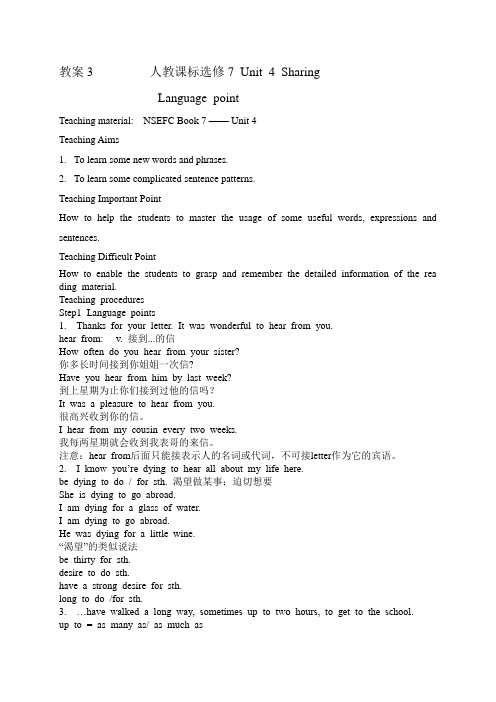
教案3 人教课标选修7 Unit 4 SharingLanguage pointTeaching material: NSEFC Book 7 —— Unit 4Teaching Aims1.To learn some new words and phrases.2.To learn some complicated sentence patterns.Teaching Important PointHow to help the students to master the usage of some useful words, expressions and sentences.Teaching Difficult PointHow to enable the students to grasp and remember the detailed information of the rea ding material.Teaching proceduresStep1 Language points1. Thanks for your letter. It was wonderful to hear from you.hear from: v. 接到...的信How often do you hear from your sister?你多长时间接到你姐姐一次信?Have you hear from him by last week?到上星期为止你们接到过他的信吗?It was a pleasure to hear from you.很高兴收到你的信。
I hear from my cousin every two weeks.我每两星期就会收到我表哥的来信。
注意:hear from后面只能接表示人的名词或代词,不可接letter作为它的宾语。
2. I know you’re dying to hear all about my life here.be dying to do / for sth. 渴望做某事;迫切想要She is dying to go abroad.I am dying for a glass of water.I am dying to go abroad.He was dying for a little wine.“渴望”的类似说法be thirty for sth.desire to do sth.have a strong desire for sth.long to do /for sth.3. …have walked a long way, sometimes up to two hours, to get to the school.up to = as many as/ as much asHe can earn up to $50,000 a year.up to 还可以表示1)be up to sth = be busy doing sth. 忙于2)It is up to sb to do sth 由某人负责做某事3)一直She lived at home right up to / until she got married.What are these naughty boys up to?It is up to me to do this task.I am not sure if she is really up to that job.4. I’m still trying to adapt to these conditions but, one thing is …adapt (oneself) to 适应,适合The new students are very slow to adapt to the rules.新生对于那些规定适应得很慢。
【范文】人教版高中英语选修7教案Unit 4 Sharing
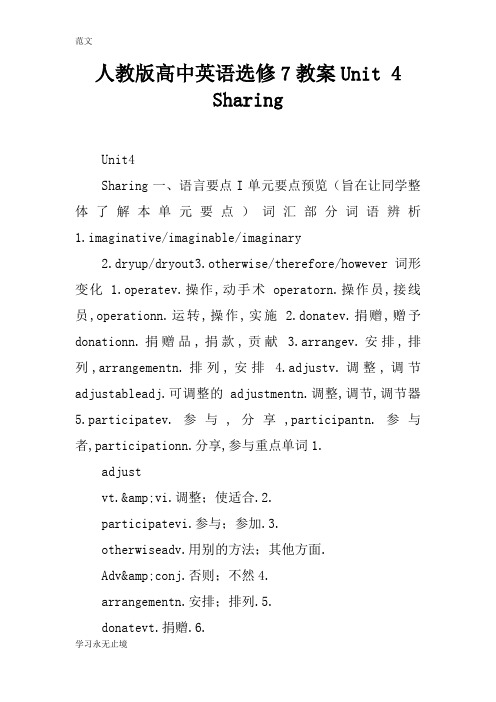
人教版高中英语选修7教案Unit 4SharingUnit4Sharing一、语言要点I单元要点预览(旨在让同学整体了解本单元要点)词汇部分词语辨析1.imaginative/imaginable/imaginary2.dryup/dryout3.otherwise/therefore/however词形变化 1.operatev.操作,动手术operatorn.操作员,接线员,operationn.运转,操作,实施 2.donatev.捐赠,赠予donationn.捐赠品,捐款,贡献 3.arrangev.安排,排列,arrangementn.排列,安排4.adjustv.调整,调节adjustableadj.可调整的adjustmentn.调整,调节,调节器5.participatev.参与,分享,participantn.参与者,participationn.分享,参与重点单词1.adjustvt.&vi.调整;使适合.2.participatevi.参与;参加.3.otherwiseadv.用别的方法;其他方面.Adv&conj.否则;不然4.arrangementn.安排;排列.5.donatevt.捐赠.6.purchasevt.&n.买;购买.7.distributionn.分配;分发;分布状态.8.relevantadj.有关的,相应的9.operatev.操作,运转,开动,起作用重点词组dyingto.极想;渴望.theotherday几天前stickout.伸出inneed.在困难中;在危急中.重点句型1.whenIreachtheschoolgroundstherearelotsof “goodmorning”formefromtheboys.2.youaskedwhetherI’mgettingtoknowanylocalpeople.3.Thegiftcoversthecost ofexercisebooksandtextbooksforcommunityprimaryschoo lsthatoperateinpoororremotevillages.重点语法限制性定语从句II词语辨析1).imaginative/imaginable/imaginaryadj.【解释】imaginative富有想象力的,创新的imaginable可想象得到的imaginary想象中的,虚构的【练习】选择imaginative/imaginable或imaginary并用其适当的形式填空1)Althoughthemaincharactersinthenovelaresotruetolif e,theyare_______.2)It’s_______forsuchan_______writertocreate_______storie s.3)Thisistheonlysolution_________.4)Thefamouspoemwasfroman______poet.keys:1)imaginary2)imaginable;ima ginative;imaginary3)imaginable4)imaginative2).dryup /dryout【解释】dryup使完全变干;(河流,湖泊等)干涸dryout变干,干透【练习】选择dryup或dryout,并用其适当的形式填空1)Thefarmerspumpedwatertotheirfieldstostopthesoil__ ______.2)Thepool________inthelateautumn.3)Thevillag ershadtowaitforthesunto_________thedirtroad.4)Don’tleavethevegetableonthetable,oritwill________.keys: 1)dryingout2)driesup3)dryup4)dryout3)otherwise/ther efore/however【解释】otherwise否则;不然thereforeadv.因此,所以however无论如何,可是【练习】选择otherwise/therefore或however并用其适当的形式填空1)Hedidn'tworkhardatEnglish_______hewouldn'tfinditd ifficulttolearnnow.2)wedonothaveenoughmoney._____ ____wecannotaffordtobuythenewcar.3)Thefirstpartwas easy;thesecond,________,tookhours.4)Heisnoisy,but________aniceboy.5)weweregoingtoplayfootball,butitwassohotthatwedecidedtodo_____________.keys:1 )otherwise2)Therefore3)however4)otherwise5)otherwiseIII词性变化(旨在提供语法填空所需材料)1.operatev.操作,动手术operatorn.操作员,接线员,operationn.运转,操作,实施2.donatev.捐赠,赠予donationn.捐赠品,捐款,贡献 3.arrangev.安排,排列,arrangementn.排列,安排 4.adjustv.调整,调节adjustableadj.可调整的adjustmentn.调整,调节,调节器5.participatev.参与,分享,participantn.参与者,participationn.分享,参与【练习】根据句子结构,用括号内所提供词的适当形式填空1)Theyencouragedthe_______to_______inthesingingperf ormanceafterthecontest..2)Thedoctorare________onan______ofafactorywhogotinjuredwhen_______amachine,and the________issaidtolastovertenhours.3)Theseatsinthe planeare________,andyoucan________themtoacertainang le.The______isnotdifficulttomake.4)Thedrinkswere________tothembycocacolacompanyandtheyreceived_______f romothercompaniesaswell.5)ourdepartmentwillbeinchar geof_______theconference.wouldyoupleasegiveussomesu ggestionsonthe_______forit?keys:1)participants;part icipate2)operating;operator;operating;operation3)ad justable;adjust;adjustment4)donated;donation5)arran ging;arrangementIV重点词汇(旨在提供综合运用所需材料)1.adjustvt.&vi.调整;使适合.[重点用法]adjustmentn.调整;修正adjustableadj.可调节的;可调整的adjust使适应;适应。
人教版选修7unit4SharingP2教学设计
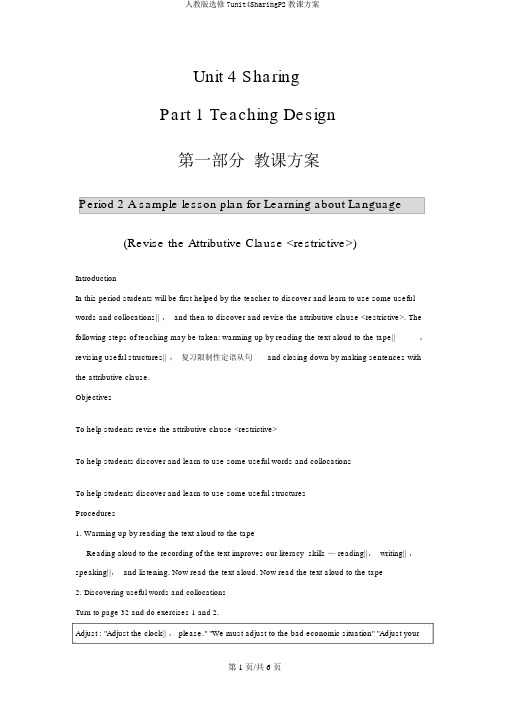
Unit 4 SharingPart 1 Teaching Design第一部分教课方案Period 2 A sample lesson plan for Learning about Language (Revise the Attributive Clause <restrictive>)IntroductionIn this period students will be first helped by the teacher to discover and learn to use some useful words and collocations|| , and then to discover and revise the attributive clause <restrictive>. The following steps of teaching may be taken: warming up by reading the text aloud to the tape||,revising useful structures|| ,复习限制性定语从句and closing down by making sentences with the attributive clause.ObjectivesTo help students revise the attributive clause <restrictive>To help students discover and learn to use some useful words and collocationsTo help students discover and learn to use some useful structuresProcedures1. Warming up by reading the text aloud to the tapeReading aloud to the recording of the text improves our literacy skills — reading||, writing|| ,speaking||, and listening. Now read the text aloud. Now read the text aloud to the tape2.Discovering useful words and collocationsTurn to page 32 and do exercises 1 and 2.Adjust : "Adjust the clock|| , please." "We must adjust to the bad economic situation" "Adjust youreyes to the darkness"Grill : "He cooked hamburgers on the grill."Relevant : The scientist corresponds with colleagues in order to learn about matters relevant to her own research."Doorway: "He stuck his head in the doorway."Arrangement: T hey made arrangements to meet in Chicago." "He changed the arrangement of the topics." "the arrangement of the furniture"; "the placement of the chairs"3.Revising useful structuresNow you may turn to page 32 to do exercises 1.You are to finish the sentence with your own words.1.I made the present which would entertain you.2.Painting is an activity that is connected with paints and brushes.3.The person to whom you are dying to hear about is on holiday.4.The man who lives at the bush school is a doctor.5.The woman whose daughter you got to know yesterday is over there.6.You won ’ t find the theatre where jumped out of the window unless you have a map.7.Anne is doing some research on the time when I started crying“ AAAAA”.8.The reason why he arrived at the village so late was that he was watching an interview of the first Chinese astronaut on TV .Next you are going to do exercise 2 on page 32.1. I’ d like to have a friend whom I can learn English with.2. For a holiday I’ d like to go to a place where I can shout and cry.3.I ’ d like to have a bedroom that I use it as a study sometimes.4.I ’ d like to learn to play a musical instrument that may produce terrible sounds.5.The reason why he didn’ istfinishhomework is still a mystery.6.The person to whom she was married is one who could speak five languages.7.The mobile phone I’ m going to buy is one that could send picture massages.8.The day I won’ t ever forget is the day when I left my fatheroreverf.4.复习限制性定语从句一、限制性定语从句中关系代词的用法1. who||, whom|| , that三者都可修饰人||, who 作主语 ||, whom 作宾语 ||, that 既可作主语又可作宾语.(1) I don ’ t like people who lose their tempers easily.我不喜爱爱发性情的人||。
人教版高二英语选修7Unit4Sharing全单元教案
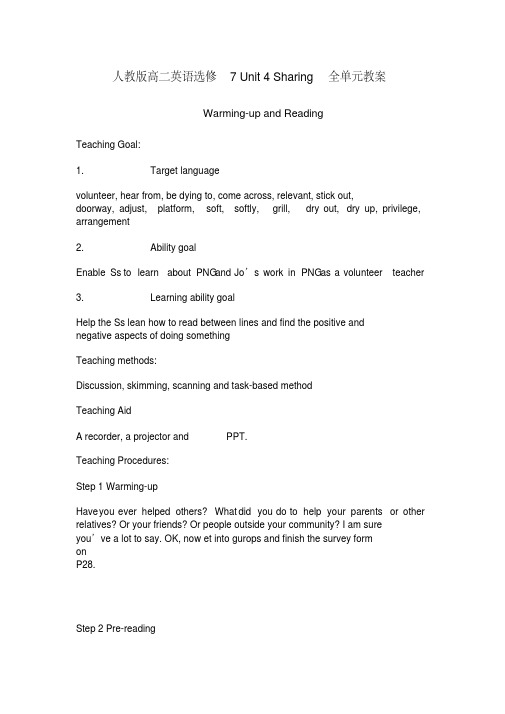
人教版高二英语选修7 Unit 4 Sharing 全单元教案Warming-up and ReadingTeaching Goal:1. Target languagevolunteer, hear from, be dying to, come across, relevant, stick out,doorway, adjust, platform, soft, softly, grill, dry out, dry up, privilege, arrangement2. Ability goalEnable Ss to learn about PNG and Jo’s work in PNG as a volunteer teacher3. Learning ability goalHelp the Ss lean how to read between lines and find the positive andnegative aspects of doing somethingTeaching methods:Discussion, skimming, scanning and task-based methodTeaching AidA recorder, a projector and PPT.Teaching Procedures:Step 1 Warming-upHave you ever helped others? What did you do to help your parents or other relatives? Or your friends? Or people outside your community? I am sureyou’ve a lot to say. OK, now et into gurops and finish the survey formonP28.Step 2 Pre-readingAsk Ss to find out PNG on the map and disucuss the photos in the reading passage.Step3 Reading1. ScanningScanning the text and fill the blanks with their names.1._____ is a young Australian woman.2.________ was dying to hear all about Jo’s life in PNG.3._______ walked a long way to get to school.4.___________ didn’t have any textbook.5._____ became a lot more imaginative when teaching.6._____ started jumping out the windows during achemistry experiment.7.________ v isited a village that was the home o f one the boys, Tombe.8._____ started crying “ieee ieee” to welcome them.9._____ led us to a low bamboo hut.10._____ was going to share the platform with Jenny and Jo.11.________ softly talked to each other in their language Jodidn’t understand2. Skimming the text and find the general idea of each paragraph.3.detailed reading Task-based (ex1 in comprehending part.Type of houseFamily relation-shipsCooking methodsSleeping arrange-mentsType of houseFamily relation-shipsCooking methodsSleeping arrange-mentsStep IV.HomeworkSuppose you've graduated from a key university and now y ou are a volunteer who works in the remote region to assit the basic education there. Andyou are to write a letter home to introduce your present situation. (youcan refer to the text).Extensive ReadingTeaching goals:1. Enable the Ss to know the purpose of a website called“world gifts” and give their opinions on it.2. Enable the Ss to learn about the international welfare programmer called “Plan International” and a child who has been sponsored through it.Teaching important and difficult points:Get the Ss to realize that they should make the most of what they own and do something for the poor.Teaching method:Task-based method and fast readingTeaching aids:A recorder, a projector, a compute connected to the Internet.Teaching procedures:Step I.RevisionDictation eight sentences, each contain the vocabulary they ‘ve learned in this unit.Step II. Pre-reading“Have you ever tried to send a gift to the children in poorareas or countries? Probably not. Today, we can have access to a website, where you can send your gifts to those who are in great need. Please glance quickly at the Internet page on Page 33, and answer the followingquestions.1. What does the page show you?2. Where is the list of gifts?3. In what kind of order are the gifts listed? How much arecheapest and dearest gift?4. where is the gift card?5. What do the photos show you?Step III. Careful ReadingReading carefully.And the task is to finish Ex2 on page 34.Discussing What do you think of this website and its idea? Do you thinkpeople will get interested in it and buy its gifts? Do you think thosegifts listed are really helpful? Now turn to page 34. Discuss the topicsin Ex 3 in groups. Choose one of the topics to discuss.Step IV. Reading TaskDeal with reading task in the work book.We have talked about the Chinese welfare programmer Project Hope whichhelps children in poor areas go back to school. In the world, there aremany organizations or programmers that help different groups of peoplein one way or another. Today, we will get to know another organizationcalled Plan International. Turn to page 73,. This is a letter from Rosannato some students. Rosanna works as a volunteer of Plan International inan area of Ecuador. Why did she write to the Ss? What did the Ss do? Read the letter and find the answers. While reading, summarize the topic ofeach paragraph and finish Ex on page74.Step V. Homework1. Ask Ss to search for information about Plan International.2. Pick out the sentences with attributive clauses in “ A letter from Plan”.WritingTeaching Goal:Enable the Ss to write about a person’s experience by using time expression_r_rEnable the Ss to write a letter to a child they would like to sponsorTeaching important and difficult pointsThe characteristics of narrationTeaching methods:Task-based methodTeaching AidA projector and PPT.Teaching Procedures:Step 1 RevisionCheck the homeworkAsk some S s to read sentences w ith attributive clauses in “ A letter from plan”.Step 2 Pre-writingLet’s recall something about Dr Mary Murray, who worked as a volunteerwith Medicines Sans Frontiers (MSF). Who’d like to say something about her? Let’s try it this way. Each of you is gi ven the chance to say only one sentence about Dr Mary Murray. OK, begin. Of course, you can have an attributive clause in your sentenceDr Mary Murray was a volunteer, who worked with Medicines Sans Frontiers (MSF).Dr Mary Murray once worked in clinic in both Malawi and Sudan which are developing countries in AfricaStep 3 WritingVery good. Now you are asked to write about Dr Murray for the school magazine. Write a paragraph on each topic below in the order shown.Remember to use time expression_r_rs listed on Page 35.Points must be included:1. who she is2. reasons why she joined MSF3. what she did in Malawi4. what she did in the Sudan5. the effects on her of her experiences.6. her plans for the futureStep 4 Writing taskDeal with writing task on Page75.Imagine that you have decided to sponsor Shanshan, a 11-year-old girl from Gansu province. Her family cannot afford to keep her at school. But sheloves practicing English. Write a letter to her in English. In your letter, you can:Introduce yourselfSay something about your interests and hobbiesDescribed your familyLet her know you want to make friend with her and her from herOther things you would like to tell her.After the Ss have finished writing, ask several of them to read theirletters.Sample writing:Dear Shanshan,I’m a student of Guangzhou No.1 senior High School, Guangdong p rovince. My English name is Steve, and I like English very much. Maybe I can helpyou to continue with your school.I go to school everyday except on Sundays. Every morning, we have four lessons, including P.E., arts, music. I like sports very much, especially football .Whenever I’m free I would play football with my classmates.I also enjoy reading English papers, which gives me great delight, andhelps improve my studies.I have a small family. There are father, mother and I. Mum often cooksdelicious food for me. And Dad u sually encourages me t o study hard in order to serve the country and people better. I think so. So I work very hardat my lessons.I’m looking forward to hearing from you. I want to know what you needbadly so that I know what I can do fro you .Don’t hesitate to ask for what you want. I will try to help youYourssincerelySteveStep 5 AssignmentAsk Ss to polish the letter they wrote in class and hand it in tomorrow.。
高二年级人教版选修7 unit4 Sharing 教案

Get some general infor. of the passage through photos.
StepⅣ Reading 1 Skimming
Look at the Practise ss’ 1) It was wonderful for ________ to hear from photos and and reading ability discuss of skimming. Rosemary. 2) ___________ is dying to hear about Jo’s life the questions. there. 3) ___________ started jumping out of the window because they had never come across anything like it. 4) _____ started crying “ieee ieee” to welcome them. 5) _______ led us to his house, a low bamboo hut with grass sticking out of the roof. 6) I felt it a privilege to have spent a day with his Skim 备课活页纸第 2 页,共 3 页
Inspire ss’ interest and get the definition of “volunteer”.
StepⅢ Pre-reading
Act out.
1. Introduce Papua New Guinea (PNG) 2. Look at the photos from Jo and answer the Answer following questions: 1) What was Jo’s job in PNG? the questions. 2) What kind of students ware in her class? Boys, girls, or both? 3) What were the classrooms like? Is the classroom well equipped? Speak 4) What can you say about the village? Out.
人教版高中英语选修7教案Unit Four Sharing
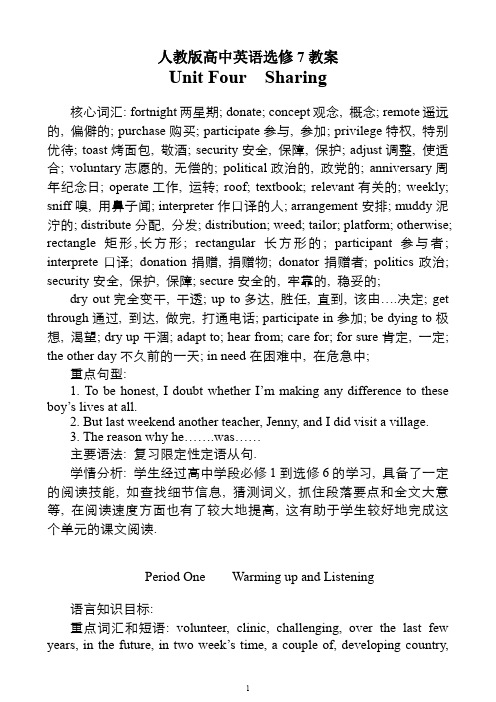
人教版高中英语选修7教案Unit Four Sharing核心词汇: fortnight两星期; donate; concept观念, 概念; remote遥远的, 偏僻的; purchase购买; participate参与, 参加; privilege特权, 特别优待; toast烤面包, 敬酒; security安全, 保障, 保护; adjust调整, 使适合; voluntary志愿的, 无偿的; political政治的, 政党的; anniversary周年纪念日; operate工作, 运转; roof; textbook; relevant有关的; weekly; sniff嗅, 用鼻子闻; interpreter作口译的人; arrangement安排; muddy泥泞的; distribute分配, 分发; distribution; weed; tailor; platform; otherwise; rectangle矩形,长方形; rectangular长方形的; participant参与者; interprete口译; donation捐赠, 捐赠物; donator捐赠者; politics政治; security安全, 保护, 保障; secure安全的, 牢靠的, 稳妥的;dry out完全变干, 干透; up to多达, 胜任, 直到, 该由….决定; get through通过, 到达, 做完, 打通电话; participate in参加; be dying to极想, 渴望; dry up干涸; adapt to; hear from; care for; for sure肯定, 一定; the other day不久前的一天; in need在困难中, 在危急中;重点句型:1. To be honest, I doubt whether I’m making any difference to these boy’s lives at all.2. But last weekend another teacher, Jenny, and I did visit a village.3. The reason why he…….was……主要语法: 复习限定性定语从句.学情分析: 学生经过高中学段必修1到选修6的学习, 具备了一定的阅读技能, 如查找细节信息, 猜测词义, 抓住段落要点和全文大意等, 在阅读速度方面也有了较大地提高, 这有助于学生较好地完成这个单元的课文阅读.Period One Warming up and Listening 语言知识目标:重点词汇和短语: volunteer, clinic, challenging, over the last few years, in the future, in two week’s time, a couple of, developing country,Medicines Sans Frontiers (MSF), Malawi, Sudan, The Fred Hollows Foundation, The Cancer Council, Youth in the City, go blind, belief Why did Mary decide to work in a developing country?In the Sudan, why was it nearly impossible for Mary to get to the clinics when the rains came?Why were conditions in the clinics in the Sudan challenging?语言技能目标: 通过听一段采访, 了解默里夫妇作为一个志愿者为Medicines Sans Frontiers工作的经历, 提高学生听前预测, 注意细节信息等听力方面的技能.情感态度和文化意识目标: 借助听力材料, 让学生自己思考是否会像莫里夫妇那样做志愿服务工作. 把学生的实际和所听到的内容结合起来, 培养学生正确的价值观.教学重点: 1) 学会边听边注意听力材料中的细节信息, 并作笔记.2) 在讲述个人生平时, 常采用时间表达法. 学会关注对话中的时间表达法以及出现的先后次序.教学难点: 1) 根据列表掌握听力材料中的细节信息. 2)学习采用时间表达法来表述一个人的生平.Step 1 Lead-inLead in the new text by asking some questions:1. Some questions1) Have you ever helped others?2) What did you do to help your parents, your friends or your relatives?2. Make a class list of the different things our classmates do for each of the groups on the survey form.3. Discuss whether someone who helps the groups on the survey form can be called a “volunteer”?Step 2 Pre-leadingTurn to Page 35, read Exercise 1 and 2 in Listening and speaking, predict what you will hear in the listening material.Step 3 Listening2. Listen to it again and answer some questions.1) Why did Mary decide to work in a developing country?________________________________________________________.2) When Mary worked in a clinic in Malawi, why did the children die?_______________________________________________________.3) In the Sudan, why it nearly impossible for Mary to get to the clinics when the rains came?________________________________________________________.4) Why were conditions in the clinic in the Sudan challenging?________________________________________________________.5) Why does Mary enjoy her job?________________________________________________________.Step 4 Listening on Page 70Listen to the materials on Page 70 and then finish the exercises in the workbook.Step 5 Homework1. Finish off the exercises.2. Look for more information about MSF on Internet and share it with your partners.Period Two Pre-reading and Reading语言知识目标:1. 正确理解和运用下列单词: airmail; fortnight; roof; muddy; textbook; concept; weekly; relevant; remote; weed; rectangle; rectangular; adjust; platform; broom; tin; jar; sniff; participate; interpreter; grill; otherwise; privilege.2. 重点词组: hear from, be dying to; the other day; dry out; dry up语言技能目标:强化略读, 查读等阅读技能, 训练通过寻找关键词, 主题句等方式更快速地准确确定文章的段落大意, 理清文章的总体框架与脉络; 运用已经掌握的基本猜词技巧猜测文章中的部分单词.语言能力目标: 增强阅读理解能力; 发展借助图片, 表格等非语言信息进行语言输出的能力.重难点:1. 获取巴布亚新几内亚独立国各部落生活状况和风俗习惯的信息; 阅读能力的培养和阅读技巧的训练, 如精读课文完成表格填空.2. 理解作为志愿者工作的意义, 从而树立正确的价值观; 训练用英语获取信息, 处理信息, 分析问题和解决问题的能力.Step 1 Warming up1. Show the sign of United Nations V olunteer in China.从整体上看,标志是一颗爱心的造型,同时还是英文“青年”首写字母“Y”的样貌。
人教版高中英语选修7《Unit4Sharing》教案
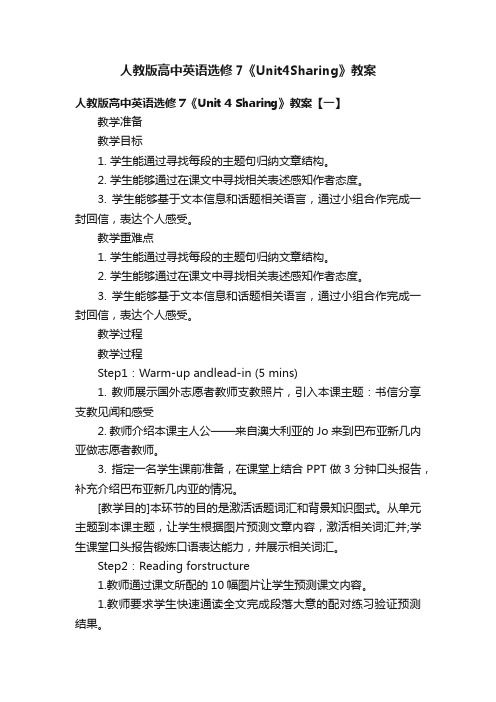
人教版高中英语选修7《Unit4Sharing》教案人教版高中英语选修7《Unit 4 Sharing》教案【一】教学准备教学目标1. 学生能通过寻找每段的主题句归纳文章结构。
2. 学生能够通过在课文中寻找相关表述感知作者态度。
3. 学生能够基于文本信息和话题相关语言,通过小组合作完成一封回信,表达个人感受。
教学重难点1. 学生能通过寻找每段的主题句归纳文章结构。
2. 学生能够通过在课文中寻找相关表述感知作者态度。
3. 学生能够基于文本信息和话题相关语言,通过小组合作完成一封回信,表达个人感受。
教学过程教学过程Step1:Warm-up andlead-in (5 mins)1. 教师展示国外志愿者教师支教照片,引入本课主题:书信分享支教见闻和感受2. 教师介绍本课主人公——来自澳大利亚的Jo来到巴布亚新几内亚做志愿者教师。
3. 指定一名学生课前准备,在课堂上结合PPT做3分钟口头报告,补充介绍巴布亚新几内亚的情况。
[教学目的]本环节的目的是激活话题词汇和背景知识图式。
从单元主题到本课主题,让学生根据图片预测文章内容,激活相关词汇并;学生课堂口头报告锻炼口语表达能力,并展示相关词汇。
Step2:Reading forstructure1.教师通过课文所配的10幅图片让学生预测课文内容。
1.教师要求学生快速通读全文完成段落大意的配对练习验证预测结果。
2.教师引导学生归纳出全文的整体结构。
[教学目的] 本环节的目的是让学生了解文章的整体结构。
不仅让学生学会寻找中心句,而且让学生从每个段落的中心句归纳出课文整体结构,让学生回顾信息交流类书信的写作结构。
Step3:Reading fordetails (10 minutes)1.教师要求学生先同桌配对合作,然后按照学习小组分组合作,仔细阅读文章细节找出信息,完成下列表格(划线部分是学生需要填出的部分):2.教师引导学生根据文章中的相关语言和信息体会作者的感情和态度。
高中英语Unit 4 Sharing 教学设计人教版选修七
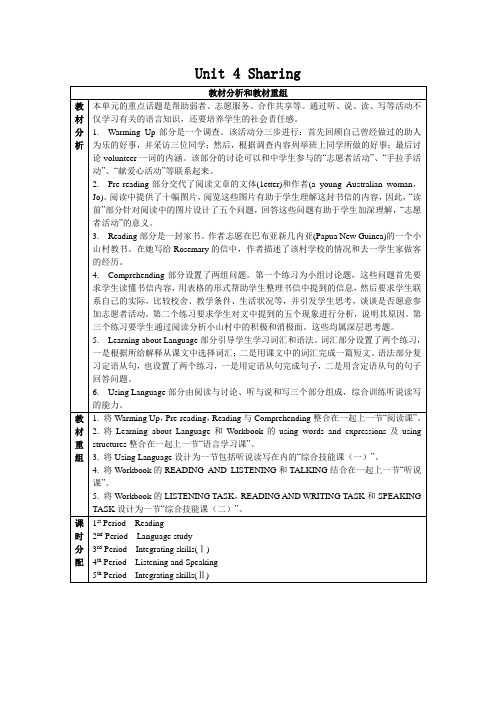
Unit 4 SharingPart 1: Teaching Design第一部分:教学设计Period 1: A sample lesson plan for reading(ALETTER HOME)AimsTo help students develop theirreading abilityTo help students learn aboutvoluntary workProceduresI. Warming up by defining volunteerWhat is a volunteer?1. One who enters into, or offers for, any service of his own free will.2. (Mil.) One who enters into service voluntarily, but who, when in service, is subject to discipline and regulations like other soldiers; -- opposed to conscript; specifically, a voluntary member of the organized militia of a country as distinguished from the standing army.II. Pre-readingHave you ever heard of a place called Papua New Guinea?Facts of Papua New GuineaCapital: Port MoresbyGovernment: constitutional monarchy with parliamentarydemocracyCurrency: kina (PGK)Area total: 462,840 sq kmland: 452,860 sq kmwater: 9,980 sq kmPopulation: 5,172,033 (July 2002 est.)Language: English spoken by 1%-2%, pidgin Englishwidespread, Motu spoken in Papua regionnote: 715 indigenous languagesReligion: Roman Catholic 22%, Lutheran 16%, Presbyterian/Methodist/London Missionary Society 8%, Anglican 5%, Evangelical Alliance 4%, Seventh-Day Adventist 1%, other Protestant 10%, indigenous beliefs 34%III. Reading for formsRead the text again to: cut/ the sentence into thought groups, blacken the predicates, darken the connectives and underline all the useful expressions.IV. Copying expressionsYou are asked to copy all the useful expressions into your notebook after class as homework.Expressions from A Letter Homethanks for…因……感谢, hear from…收到……的来信, be dy ing to do…急于做……, hear all about…了解所有关于……, include some photos附有几我照片, picture the places图象化这儿的地方, ask about…问讯关于……的信息, a bush school丛林学校, be made from…由……制成, walk to…步行到……, reach the school grounds走到学校操场, walk a long way走很长的路, sometimes up to two hours有时长达两小时, get to the school到达学校, adapt to…使适应……, one thing is for sure有一点是肯定的, become a lot more imaginative in…变得对……更富有想象力, a most challenging subject最富有挑战性的学科, carry…from…in a bucket用水桶把……带到……, show… a chemistry experiment向……演示……化学实验, bubble over everywhere到处冒气泡, come across…碰到……/见过……, jump out of the windows跳出窗外,V. Writing a letter of your own.Now you are to write a similar letter based on the topic, the words and the structures of the letter on page 29.VI. Closing down by reading more on voluntary workPeriod 2: A sample lesson plan for Learning about Language (Revise the Attributive Clause <restrictive>)AimsTo help students revise the Attributive Clause <restrictive> To help students discover and learn to use some useful words and expressionsTo help students discover and learn to use some useful structuresProceduresI. Warming up by reading the text aloud to the tapeAs a student, you know that reading aloud is important, and you probably feel frustrated if you don't read well. Now open your book to page 29 and read aloud the text A Letter Home to the tape.II. Discovering useful words and expressionsTurn to page 32 and do exercises 1 and 2.III. Revising useful structuresNow you may turn to page 32 to do exercises 1.You are to finish the sentence with your own words.Next you are going to do exercise 2 on page 32.IV. Closing down by making sentences with the Attributive ClausePeriod 3: A sample lesson plan for Using Language (THE WORLD’S MOST USEFUL GIFT CATALOGUE)AimsTo help students read the passage THE WORLD’S MOST USEFUL GIFT CATALOGUETo help students to use the language by reading, listening, speaking and writingProceduresI. Warming up by listening and reading to the tapeNow open your book to page 33. You are going to listening and reading to the tape, paying your attention to the pauses within the sentences.II. Reading for formsRead the text THE WORLD’S MOST USEFUL GIFT CATALOGUE again to: cut/ the sentence into thought groups, blacken the predicates, darken the connectives and underline all the useful expressions.III. Making sentences with the expressions from The World’sMost Useful Gift CatalogueNext you are going to making sentences using the expressions from The World’s Mos t Useful Gift Catalogue. You may include as many attributive clauses as possible.Expressions from The World’s Most Useful Gift Cataloguegive an unusual gift一份特殊的礼物, one’s loved one某人所爱的人, keep a gift保留礼物, a contribution towards…对……的捐助, choose… from this catalogue从清单中选……, a really useful gift for some of the world’s poorest送一个确实有用的礼物给世界上最穷苦的人, bring hope for a better future to…带去对未来的美好希望给……, a community in need需要帮助的社区, purchase an item购买一项礼物, send…an attractive card给……发送一个精美的卡片, send… to… 把……送给……, use the cards for any special occasion可以用在任何一种特殊的场合的礼物, purchase…from…从……购得……, train a whole village of around 40 families in new agricultural methods对整个大约40户人口的村庄进行新的农业生产方法的培训, provide seeds and simple agricultural equipment提供种子和简单的农业机械, just 20% more produce仅仅提高了20%的产量, mean the difference between sickness and health意味着患病与健康的差异, go hungry变的饥饿, provide for…为……提供,自己自足1.I was given an unusual gift by my loved daughter.2.I will keep the gift that was given to me by that blind man.3.This money will be a contribution towards those people who live in theWest of the country.4.You have to choose your school from the catalogue which was sent toyou last week.5. A really useful gift for some of the world’s poorest will bring hope for abetter future to them.6.Help must be offered to a community in need.7.You may purchase an item at our shop.8.I will send an attractive card to you.9.This letter will be sent to your special person.10.You may use the cards for any special occasion to purchase items from our shop.11.He was sent to train a whole village of around 40 families in new agricultural methods.12.Seeds and simple agricultural equipment will be provided.13.Just 20% more produce will mean the difference between sickness and health.14.The poor will go hungry this time next year.IV. Closing down by asking about volunteer workTo know more about volunteer work you may put as many questions as possible to your teacher.What is a volunteer project?Part 2: Teaching Resources第二部分:教学资源Section 1: Discourse studies of A LETTER HOMEType of writing and summary of A LETTER HOMESection 2: Background information for Unit 4 Sharing1. The five C’s in letter writingClear: Try not to beat around the bush when letter writing. Every word should come across as something that is understood. The best way to test this is to read what you wrote out loud, in a tape recorder, and play it back to yourself. Concise: Do not ramble. Try to make your words go straight to the point.Courteous: Remember that words can come across a lot harsher on paper. It’s best to save arguing to verbal usage, so thatyou can clear up any misunderstandings.Correct: Double check your spelling, grammar, and punctuation. There is nothing worse than trying to read a letter full of mistakes. It makes the clarity of the written word harder to decipher.Complete: Make sure that when you bring up a topic, you do not change topics in mid-stream. Make sure that you finish what you have to say before you go on to another topic.2. CULTURE SHOCK●Culture ShockWe can describe culture shock as the physical and emotional discomfort one suffers when coming to live in another country or a place different from the place of origin.●Symptoms:Sadness, loneliness, melancholyPreoccupation with healthAches, pains, and allergiesInsomnia, desire to sleep too much or too littleChanges in temperament, depression, feeling vulnerable, feeling powerlessAnger, irritability, resentment, unwillingness to interact with othersIdentifying with the old culture or idealizing the old countryLoss of identityTrying too hard to absorb everything in the new culture or countryUnable to solve simple problemsLack of confidenceFeelings of inadequacy or insecurityDeveloping stereotypes about the new cultureDeveloping obsessions such as over-cleanlinessLonging for familyFeelings of being lost, overlooked, exploited or abused。
人教新课标选修7 Unit4 Sharing[教案]
![人教新课标选修7 Unit4 Sharing[教案]](https://img.taocdn.com/s3/m/256e26757cd184254b3535f1.png)
Unit 4 Sharing Ⅰ. 单元教学目标技能目标Skill Goals▲Talk about helping others and voluntary work▲Practise expressing time sequence and logical relations▲Revise the Attributive Clause (restrictive)▲Write a narrationⅡ. 目标语言功能句式Express logical relationsWhy would you ...?How could you do that?Because I want to share with others ... First, find some information through ...The reason is that ... Then ... Next ... Finally ...词汇1.四会词汇Airmail fortnight roof muddy textbook concept weekly relevant remote weed rectangle rectangular adjust platform broom tin jar sniff participate interpreter grill otherwise privilege paperwork arrangement toast comb astronaut angle catalogue donate voluntary purchase anniversary seed sew ox trunk tractor Kenya click tailor political distribute distribution security operate clinci2.认读词汇Papua New Guinea, bucket, bubble, Pidgin, slope, leftover, evil, vaccination, loan, supplement, Bangladesh, Tanzania, economic, Uganda, Sudan, Medecins Sans Frontieres (MSF), Malawi3.词组hear from, be dying to, come across, stick out, dry out, dry up, in need, sewing machine, trunk library4.重点词汇purpose, theme, determination, nation, birth, ancestor, joy, treat, peace结构Revise the Attributive Clause (restrictive)引导定语从句的关系代词who/whom/whose/which/that等以及关系副词where/when/why等在定语从句中担任句子成分和表达意义的小结重点句子1. …I’ve included some photos which will help you picture the places I talk about. P292. When I reach the school grounds there are lots of “good mornings” for me from the boys. Many of them have walked a long way, sometimes up to two hours, to get to the school. P293. The other day I was showing the boys the weekly chemistry experiment when, before I knew it, the mixture was bubbling over every where. P294. Sometimes I wonder how relevant chemistry is to these students, most of whom will be going back to their villages after Year 8 anyway. P295. But last weekend another teacher, Jenny, and I did visit a village which is the homeof one of the boys, Tombe. P296. We walked for two and a half hours to get there — first up a mountain to a ridgefrom where we had fantastic views and then down a steep path to the valley below.P297. Tombe’s father, Mukap, led us to his house, a low bamboo hut with grass stickingout of the roof —this shows it’s a man’s house. P298. To let you know that I am t hinking of you, I have purchased a gift from the World’sMost Useful Gift Catalogue for you to give to some of the world’s poorest. P34Ⅲ. 教材分析和教材重组1. 教材分析本单元以Sharing为话题,旨在通过单元教学,使学生了解世界上很多地方依然很落后,从而懂得同情,学会分享。
人教版高二英语选修七Unit4 Sharing教案设计
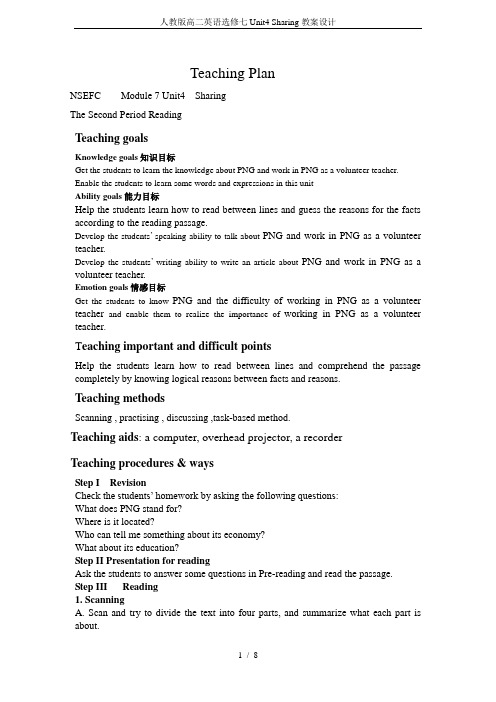
Teaching PlanNSEFC Module 7 Unit4 SharingThe Second Period ReadingTeaching goalsKnowledge goals知识目标Get the students to learn the knowledge about PNG and work in PNG as a volunteer teacher. Enable the students to learn some words and expressions in this unitAbility goals能力目标Help the students learn how to read between lines and guess the reasons for the facts according to the reading passage.Develop the students’ speaking ability to talk about PNG and work in PNG as a volunteer teacher.Develop the students’writing ability to write an article about PNG and work in PNG as a volunteer teacher.Emotion goals情感目标Get the students to know PNG and the difficulty of working in PNG as a volunteer teacher and enable them to realize the importance of working in PNG as a volunteer teacher.T eaching important and difficult pointsHelp the students learn how to read between lines and comprehend the passage completely by knowing logical reasons between facts and reasons.Teaching methodsScanning , practising , discussing ,task-based method.Teaching aids: a computer, overhead projector, a recorderTeaching procedures & waysStep I RevisionCheck the students’ homework by asking the following questions:What does PNG stand for?Where is it located?Who can tell me something about its economy?What about its education?Step II Presentation for readingAsk the students to answer some questions in Pre-reading and read the passage.Step III Reading1. ScanningA. Scan and try to divide the text into four parts, and summarize what each part is about.B. help the students to master the basic forms of a letter writing.2.Careful readingRead paragraphs 2-7 and then do the exercise.Step IV PracticeA.Find words in the passage that have the following meaning.B.Learn the following words or phrases by heart and complete the paragraph.stick out, come across, hear from, platform,(be) dying toStep V Post-readingDeveloping : I. guessingGuess the reasons for the facts according to the reading passage.Developing : II. discussionAsk the students to discuss the following question in group:Why do you think Jo became a volunteer in PNG?(Give as many possible reasons as you can.)Give the students a sample of the discussions :A: I think, first of all, Jo was a kind-hearted woman, who is willing to help others. Second, she knew enough about the poor conditions in PNG and thought that she could help teach in the schools. If I am given the chance, I will do whatever I can to help.B: In my opinion, Jo must have worked as a teacher in Australia, and she applied to become a volunteer abroad, and then she was sent to PNG as a volunteer.C: Maybe she thinks that education is the key to solving all the problems in PNG, so she, as a teacher, goes to PNG to help.Homework1. Finish Exercise 3 on Page 31.2. Read the passage again after class and find all the attributive clauses in it.3.Recite the key sentences in the text.教学流程图:Recite the following phrases and sentences after class:1.stick out 伸出e across 偶然发现或遇到;碰见3.hear from 接到……的信4.(be) dying to 极想;渴望5.in need 在困难中6.adapt (oneself) to 适应,适合7.for sure肯定如此,毫无疑问8.make a difference有关系;起(重要)作用9.dry up(河流,湖泊)干涸;(使)枯竭10.dry out(使)变干;(把)弄干11.adjust to 适应12.in the night在夜间1). I know you’re dying to hear all about my life here.2). I’ve included some photos which will help you picture the places I talk about.3). Tombe’s father, mukap, led us to his house, a low bamboo hut grasssticking out of the roof----this shows it’s a man’s house.4). When I reach the school grounds there are lots of “good mornings”for me from the boys, many of whom have walked a long way, sometimes up to two hours, to get to the school.5). In fact , I wonder if you could post this letter for me.。
人教版高中英语选修七unit 4《sharing》period 4优秀教案(重点资料).doc
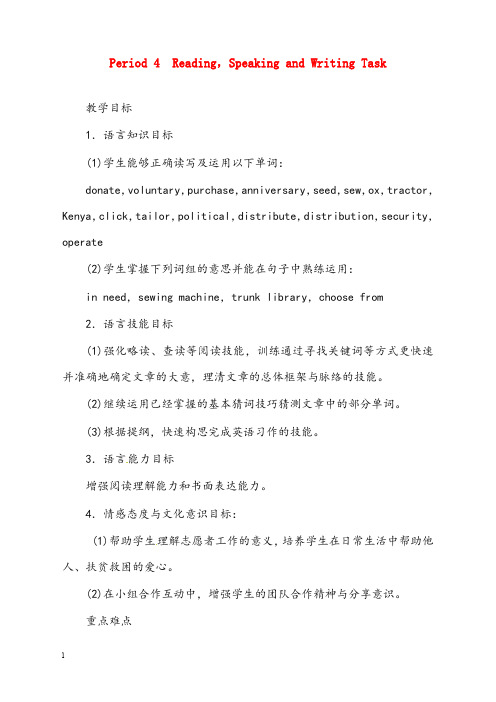
Period 4 Reading,Speaking and Writing Task教学目标1.语言知识目标(1)学生能够正确读写及运用以下单词:donate,voluntary,purchase,anniversary,seed,sew,ox,tractor,Kenya,click,tailor,political,distribute,distribution,security,operate(2)学生掌握下列词组的意思并能在句子中熟练运用:in need,sewing machine,trunk library,choose from2.语言技能目标(1)强化略读、查读等阅读技能,训练通过寻找关键词等方式更快速并准确地确定文章的大意,理清文章的总体框架与脉络的技能。
(2)继续运用已经掌握的基本猜词技巧猜测文章中的部分单词。
(3)根据提纲,快速构思完成英语习作的技能。
3.语言能力目标增强阅读理解能力和书面表达能力。
4.情感态度与文化意识目标:(1)帮助学生理解志愿者工作的意义,培养学生在日常生活中帮助他人、扶贫救困的爱心。
(2)在小组合作互动中,增强学生的团队合作精神与分享意识。
重点难点1.教学重点:阅读能力、写作能力的培养和提高。
2.教学难点:训练用英语获取信息、处理信息、分析问题和解决问题的能力;用英语说明自己学习生活情况的能力。
教学准备1.学生的学习准备:熟读本单元的单词词组,想一想如何用英语向别人介绍自己的情况。
2.教师的教学准备:查找“希望工程”的相关信息。
3.教学用具的设计和准备:制作与课文相关的多媒体课件。
教学过程Step 1 Pre-readingSeveral questions:1.What can we do for the children in poor areas or countries?2.Have you ever tried to send a gift or something to the children in poor areas or countries?How can you send the gifts to them?Now let's read the passage“The World's Most Useful Gift Catalogue”.[设计说明] 通过几个问题直接引入要学习的内容。
人教版高中英语选修7教案Unit4Sharing
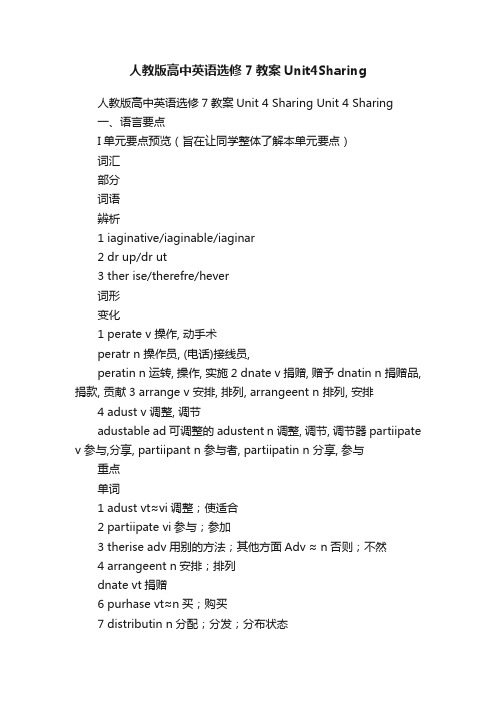
人教版高中英语选修7教案Unit4Sharing人教版高中英语选修7教案Unit 4 Sharing Unit 4 Sharing一、语言要点I单元要点预览(旨在让同学整体了解本单元要点)词汇部分词语辨析1 iaginative/iaginable/iaginar2 dr up/dr ut3 ther ise/therefre/hever词形变化1 perate v 操作, 动手术peratr n 操作员, (电话)接线员,peratin n 运转, 操作, 实施2 dnate v 捐赠, 赠予dnatin n 捐赠品, 捐款, 贡献3 arrange v 安排, 排列, arrangeent n 排列, 安排4 adust v 调整, 调节adustable ad可调整的adustent n 调整, 调节, 调节器partiipate v 参与,分享, partiipant n 参与者, partiipatin n 分享, 参与重点单词1 adust vt≈vi调整;使适合2 partiipate vi参与;参加3 therise adv用别的方法;其他方面Adv ≈ n否则;不然4 arrangeent n安排;排列dnate vt捐赠6 purhase vt≈n买;购买7 distributin n分配;分发;分布状态8 relevant ad 有关的, 相应的9 perate v 操作, 运转, 开动, 起作用重点词组(be) ding t 极想;渴望the ther da 几天前sti ut 伸出in need 在困难中;在危急中重点句型1 hen I reah the shl grunds there are lts f “gd rning” fr e fr the bs2 u ased hether I’getting t n an lal peple3 The gift vers the st f exerise bs and textbs fr unit priar shls that perate inpr r rete villages重点语法限制性定语从句(见语法专题)II 词语辨析(旨在提供完形填空所需材料) 1) iaginative/iaginable/iaginar ad【解释】iaginative富有想象力的,创新的iaginable可想象得到的iaginar想象中的,虚构的【练习】选择iaginative/iaginable或iaginar并用其适当的形式填空1) Althugh the ain haraters in the nvel are s true t life, the are _______2) It’s _______ fr suh an _______ riter t reate _______ stries3) This is the nl slutin _________4) The faus pe as fr an ______ petes: 1) iaginar 2) iaginable; iaginative ; iaginar 3) iaginable 4) iaginative。
人教版高中英语选修7教案Unit 4 Sharing

人教版高中英语选修7教案Unit 4SharingUnit4Sharing一、语言要点I单元要点预览(旨在让同学整体了解本单元要点)词汇部分词语辨析1.imaginative/imaginable/imaginary2.dryup/dryout3.otherwise/therefore/however词形变化 1.operatev.操作,动手术operatorn.操作员,接线员,operationn.运转,操作,实施 2.donatev.捐赠,赠予donationn.捐赠品,捐款,贡献 3.arrangev.安排,排列,arrangementn.排列,安排4.adjustv.调整,调节adjustableadj.可调整的adjustmentn.调整,调节,调节器5.participatev.参与,分享,participantn.参与者,participationn.分享,参与重点单词1.adjustvt.&vi.调整;使适合.2.participatevi.参与;参加.3.otherwiseadv.用别的方法;其他方面.Adv&conj.否则;不然4.arrangementn.安排;排列.5.donatevt.捐赠.6.purchasevt.&n.买;购买.7.distributionn.分配;分发;分布状态.8.relevantadj.有关的,相应的9.operatev.操作,运转,开动,起作用重点词组dyingto.极想;渴望.theotherday几天前stickout.伸出inneed.在困难中;在危急中.重点句型1.whenIreachtheschoolgroundstherearelotsof “goodmorning”formefromtheboys.2.youaskedwhetherI’mgettingtoknowanylocalpeople.3.Thegiftcoversthecost ofexercisebooksandtextbooksforcommunityprimaryschoo lsthatoperateinpoororremotevillages.重点语法限制性定语从句II词语辨析1).imaginative/imaginable/imaginaryadj.【解释】imaginative富有想象力的,创新的imaginable可想象得到的imaginary想象中的,虚构的【练习】选择imaginative/imaginable或imaginary并用其适当的形式填空1)Althoughthemaincharactersinthenovelaresotruetolif e,theyare_______.2)It’s_______forsuchan_______writertocreate_______storie s.3)Thisistheonlysolution_________.4)Thefamouspoemwasfroman______poet.keys:1)imaginary2)imaginable;ima ginative;imaginary3)imaginable4)imaginative2).dryup /dryout【解释】dryup使完全变干;(河流,湖泊等)干涸dryout变干,干透【练习】选择dryup或dryout,并用其适当的形式填空1)Thefarmerspumpedwatertotheirfieldstostopthesoil__ ______.2)Thepool________inthelateautumn.3)Thevillag ershadtowaitforthesunto_________thedirtroad.4)Don’tleavethevegetableonthetable,oritwill________.keys: 1)dryingout2)driesup3)dryup4)dryout3)otherwise/ther efore/however【解释】otherwise否则;不然thereforeadv.因此,所以however无论如何,可是【练习】选择otherwise/therefore或however并用其适当的形式填空1)Hedidn'tworkhardatEnglish_______hewouldn'tfinditd ifficulttolearnnow.2)wedonothaveenoughmoney._____ ____wecannotaffordtobuythenewcar.3)Thefirstpartwas easy;thesecond,________,tookhours.4)Heisnoisy,but________aniceboy.5)weweregoingtoplayfootball,butitwassohotthatwedecidedtodo_____________.keys:1 )otherwise2)Therefore3)however4)otherwise5)otherwiseIII词性变化(旨在提供语法填空所需材料)1.operatev.操作,动手术operatorn.操作员,接线员,operationn.运转,操作,实施2.donatev.捐赠,赠予donationn.捐赠品,捐款,贡献 3.arrangev.安排,排列,arrangementn.排列,安排 4.adjustv.调整,调节adjustableadj.可调整的adjustmentn.调整,调节,调节器5.participatev.参与,分享,participantn.参与者,participationn.分享,参与【练习】根据句子结构,用括号内所提供词的适当形式填空1)Theyencouragedthe_______to_______inthesingingperf ormanceafterthecontest..2)Thedoctorare________onan______ofafactorywhogotinjuredwhen_______amachine,and the________issaidtolastovertenhours.3)Theseatsinthe planeare________,andyoucan________themtoacertainang le.The______isnotdifficulttomake.4)Thedrinkswere________tothembycocacolacompanyandtheyreceived_______f romothercompaniesaswell.5)ourdepartmentwillbeinchar geof_______theconference.wouldyoupleasegiveussomesu ggestionsonthe_______forit?keys:1)participants;part icipate2)operating;operator;operating;operation3)ad justable;adjust;adjustment4)donated;donation5)arran ging;arrangementIV重点词汇(旨在提供综合运用所需材料)1.adjustvt.&vi.调整;使适合.[重点用法]adjustmentn.调整;修正adjustableadj.可调节的;可调整的adjust使适应;适应。
人教版高中英语选修7教案unit4sharing5
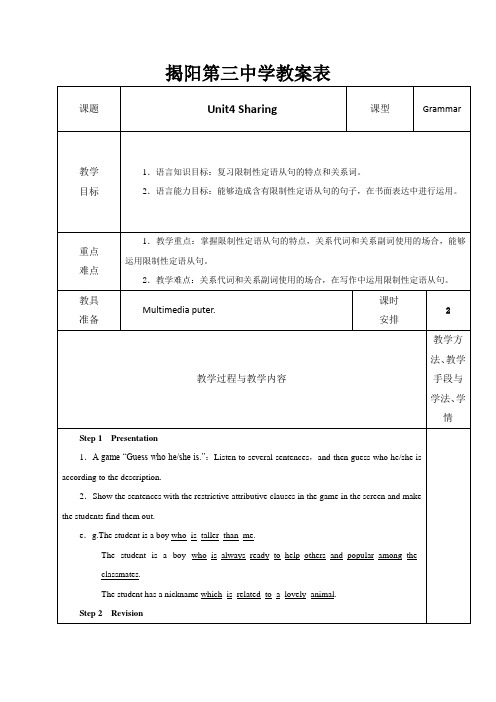
(4)Why didn't you finish your homework?(why)
(5)What kind of person is she married to?(to whom)
从功能上看,限制性定语从句对先行词起着修饰和限制的作用,如果去掉从句,会影响到整个主句的意思。
2.Revise the relative pronouns and adverbs of restrictive attributive clauses.
the usage of the relative pronoun
2.Show the sentences with the restrictive attributive clauses in the game in the screen and make the students find them out.
e.g.The student is a boywho_is_taller_than_me.
Step 2Revision
1.Revise the characteristics of restrictive attributive clauses.(The students can say that in Chinese.)
从形式上看,限制性定语从句与先行词(被定语从句修饰的名词或代词)之间没有逗号。
(6)Is this the library from ______ you borrow books?
(7)I've read all the books ______ are not mine.
- 1、下载文档前请自行甄别文档内容的完整性,平台不提供额外的编辑、内容补充、找答案等附加服务。
- 2、"仅部分预览"的文档,不可在线预览部分如存在完整性等问题,可反馈申请退款(可完整预览的文档不适用该条件!)。
- 3、如文档侵犯您的权益,请联系客服反馈,我们会尽快为您处理(人工客服工作时间:9:00-18:30)。
BOOK 7 Unit4 Sharing重点词汇与短语:relevant adjust purchase participate donate voluntary otherwise dying to come across stick out in need dry out the other day重点句型:It is/was+ adj./ n. +(for sb. )+to do…重点词汇relevant【原句回放】Sometimes I wonder how relevant chemistry is to the kids, most of whom will be going back to their villages after year 8. (Page 29)【点拨】relevant:adj. connected with the subject or be connected with有关的; 恰当的, 贴切的, 切题的常用搭配:be relevant to1)His nationality is not relevant to whether he is a good lawyer.他的国籍与是否是个好律师无关。
2)This type of university course is no longer relevant to today’s problem.这种大学课程与目前问题不再有关联了。
【拓展】relevance 用作名词,也可以说relevancy;其反义词是ir relevant;adjust 【原句回放】The hut was dark inside, so it took time for our eyes to adjust. (Page 30)【点拨】adjust vt. to change slightly to make suitable for a particular job or new conditions.调整;调节;使适合;使适应;相关短语:adjust oneself to sth./ doing sth. …使自己适应于……【拓展】形容词:adjustable 名词:adjustmentmake an adjustment 做出调整。
purchase【原句回放】When you purchase an item, we’ll send you an attractive card for you to send to your special person. (Page 34)【点拨】purchase vt. to buy or to gain sth at the cost of effort, suffering or sth else 购买; (以某种代价)换得;(经过努力)取得,赢得(常与with连用)1)It will cost almost all the money for an old couple to purchase a house now.现在一对老夫妻要买一幢房子要花掉几乎所有的钱。
2)They purchased life at the expense of honour. 他们用荣誉换取了生命。
【拓展】purchase作名词, 指“购买; 购得物”。
participate【原句回放】I loved listening to the family softly talking to each other in their language, even though I could not participate. (Page 30)【点拨】participate vi. to take part or have a share in an activity or event参与, 参加;分享, 分担经常与in连用。
1)Everyone in the class is expected to participate in these discussions.班里每个人都想参加这些讨论。
2)I will participate in your suffering and joy. 我将和你同甘共苦。
【拓展】participant n.表示“参与者,分享者”;participation n.表示“参与,分享”otherwise【原句回放】Otherwise they don’t waste anything.(Page 30)【点拨】otherwise adv. differently or in the other way; if not; 用别的方法;其他方面;否则;We were going to play football, but it was so hot that we decided to do otherwise.(用别的方法)1)He is noisy, but otherwise a nice boy. (其他方面)2)We’ll go early, otherwise we may not get a seat. (否则)【拓展】or otherwise或用其他方式;或不是;或相反voluntary【原句回放】The gift you give is not something your loved one keeps but a voluntary contribution towards the lives of people who really need it. (Page 34)【点拨】voluntary adj.自愿的,志愿的,无偿的1)When she retired she did a lot of voluntary work for the Red Cross.她退休后为红十字会做了许多义务工作。
【拓展】volunteer n. 志愿者;v. 自愿或无偿地给予帮助相关短语:volunteer to do sth. 自愿/志愿做某事donate【原句回放】Would you like to donate an unusual gift? (Page 34)【点拨】donate vt. to make a gift of sth. for a good purpose 捐赠,如:1)The businessman donated a lot of money to the hospital.这个商人想那家医院捐了很多的钱。
2)This computer was donated to us by a local company.这台计算机是当地一家公司捐赠给我们的。
【拓展】donation n.捐赠、捐赠物相关短语:give/ make/ present a donation to 捐赠重点短语:hear from【原句回放】Itwas wonderful to hear from you. (Page 29)【点拨】hear from sb.收到......的来信Not having heard from him for months, his mother was worried.几个月没有收到他的来信了,他妈妈很担心。
【拓展】hear about 听说......的事hear of ①听说(主要用于否定句及疑问句);②听从(与will,would连用,用于否定句)1)Have you heard about the new anticancer drug? 你听说过这种抗癌新药吗?2)I’ve never heard of such a person. 我从没有听说这样一个人。
3)He wouldn’t hear of me paying for the bill. 我要付账,他不肯。
the other day 【原句回放】The other day I was showing the boys the weekly chemistry experiment when, before I knew it, the mixture was bubbling over everywhere.(Page 29)【点拨】the other day前几天,不久前的一天It was a terrible piece of work that you turned in the other day. 那天你交的作业太糟糕了。
【拓展】有day的几个短语:①another day另一天,例:The shop is closed today so we’ll come another day.商店今天关门,所以我们改日再来。
Another day dragged by. 又挨过了一天。
be dying to【原句回放】I know you’re dying to hear all about my life here. (Page 29)【点拨】be dying to do sth.相当于be eager to do sth.,long to do sth. 极想/ 渴望做某事be dying for sth.相当于long for sth. (口语) 渴望/很想某物All of us are dying to see the film after hearing about it.听说这部电影后,我们都极想看。
He was dying for something to drink. 他极想有点什么喝的。
【拓展】由动词die构成的短语:die away 逐渐停止,逐渐消失die down逐渐减弱,逐渐模糊;die off 相继死去die out逐渐消失; 灭绝come across【原句回放】The boys had never come across anything like this and started jumping out of the window. (Page 29)【点拨】come across:meet or discover by chance, 偶然遇到或发现, 碰见。
有时也表示“受欢迎,发生效果”。
1)She came across some old letters in the course of her search.她搜查时发现了一些旧信。
【拓展】常见的含有come的其它短语:come out 出版,被刊行come round重来,苏醒过来,回心转意come to 达到,达成,归结为come about 发生come down 传递,传给come along 进展;偶然发生stick out【原句回放】Tombe’s father, Mukap, led us to his house, a low bamboo hut with grass sticking out of the roof. (Page 29)【点拨】stick out相当于to reach further than usual or to continue to the end of sth.伸出,突出;坚持到底;显眼,醒目。
